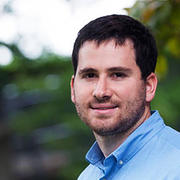
Mason is one of ten award winners. More than 300 applied.
Today, the Arnold and Mabel Beckman Foundation announced the 2019 winners of the Beckman Young Investigator Award. Jarad Mason, an assistant professor of chemistry and chemical biology at Harvard, is one of just ten awardees, selected for their promise as early career faculty members in the chemical and life sciences.
“Our new 2019 BYI awardees are tackling a broad range of challenges," says Dr. Anne Hultgren, Executive Director of the Beckman Foundation, "from production of sustainable plastics and batteries, to new rapid genetic screening techniques for cancer therapies, to modeling of magnetic quantum materials, among others."
Mason and his lab members combine synthetic chemistry and nanotechnology to design materials that tackle basic science challenges in energy and sustainable development.
In particular, he designs chemical strategies to manipulate how materials use and store energy and crafts artful changes in entropic effects, phase transitions, and porosity in both inorganic and organic materials.
Mason's manipulations could, for example, create gas storage materials for hydrogen-powered vehicles, a method to extract carbon dioxide—a powerful greenhouse gas—from the atmosphere, or an energy-efficient house built with materials that store heat for later use.
The Beckman Foundation selects their Young Investigators with an elevated goal in mind: They hope awardees invent methods, instruments, and materials that bring into existence new fields of scientific research to explore. Or, as a video on the Foundation's webpage states, "to prove what some might think of as inconceivable."
The Foundation selected Mason, in part, for his exploration of porous liquids (liquids that contain a good amount of empty space). "This is a pretty fundamental area with a lot that is unknown," Mason says, "but potential applications include new types of solvents for catalytic reactions, membranes for gas separations, battery electrolytes, and gas storage materials."
A self-heating home is conceivable, if incredible. But Mason's manipulations might one day invent what we can't yet see.
